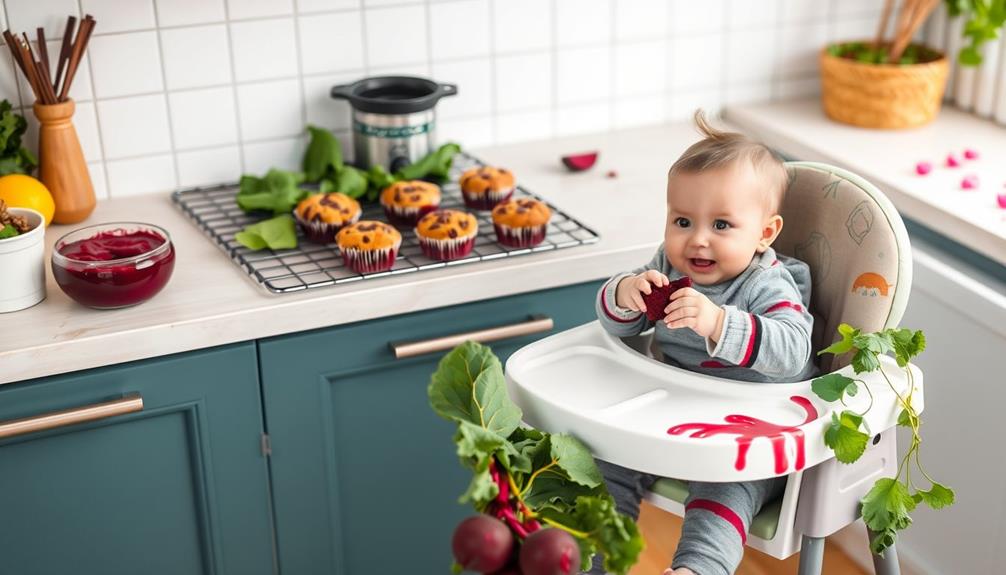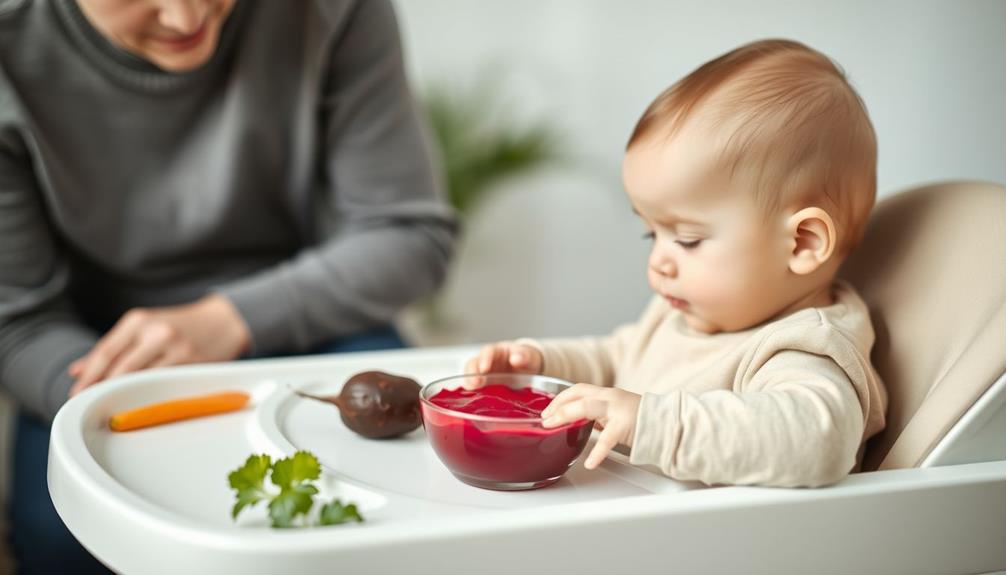Incorporating beetroot into your baby's diet is a great way to boost nutrition. Rich in folate, vitamin C, and essential minerals, beets support growth and immune function. You can start introducing cooked beets around six months old, serving them in small, soft pieces. Try recipes like mashed beetroot with apple, beet hummus, or turkey beet meatballs to make mealtime fun. Remember to monitor for any allergies and ease them into your baby's diet gradually. With a few tips and recipes in mind, you can create tasty meals that nourish your little one while discovering even more ideas and benefits.
Key Takeaways
- Beets are safe for babies around six months old; start with small portions to monitor for allergies and digestive comfort.
- Rich in essential vitamins like folate and vitamin C, beets support growth and boost immune function in infants.
- Their high fiber content aids digestion and promotes healthy gut bacteria, contributing to overall digestive health for babies.
- Easy recipes include mashed beetroot, beet hummus, and turkey beet meatballs, providing nutritious and tasty meal options for young children.
- Cooked beets have lower nitrate levels than raw, making them safer for babies; discoloration in stool or urine is harmless and temporary.
When Can Babies Eat Beets?
Most babies can safely start eating beets around six months old, when they show signs of being ready for solid foods. At this age, your little one may begin to sit up and show interest in what you're eating.
Beets are a nutrient-rich vegetable that can contribute to your baby's overall health, supporting healthy growth and development. When introducing beets, it's best to serve them cooked and in small pieces to minimize any choking hazard. Start with just 1-2 teaspoons to help ease digestion, as beets contain natural nitrates.
monitoring their reactions is important, especially with new foods. A gradual introduction is key; you can increase the quantity after your baby turns one year old if they tolerate the initial servings well. Always monitor reactions closely during this process.
Be observant for any signs of allergies or discomfort, and consult your pediatrician if you have concerns about your baby's diet.
As you incorporate beets into your baby's meals, remember that this vibrant vegetable can be a delicious part of their diet, supporting healthy growth. Keep the pieces small and guarantee they're well-cooked to make it easier for your baby to chew and swallow.
With careful preparation and attention, you can introduce this nutrient-rich food safely into their diet.
Nutritional Benefits of Beets

Beets pack a punch when it comes to essential vitamins and minerals that support your baby's growth. Their high fiber content also aids in digestion, making them a fantastic option for promoting regularity.
They also promote digestive health, making them a great choice if your little one struggles with constipation. Plus, their antioxidant properties can help strengthen your baby's immune system, giving you even more reason to include them in their diet.
Incorporating a variety of vegetables, such as beets, can enhance your child's overall nutrition and contribute to a balanced diet, which is crucial for healthy development holistic lifestyle approach.
Essential Vitamins and Minerals
Incorporating beets into your baby's diet offers a wealth of essential vitamins and minerals that can greatly benefit their health. Beetroot is packed with nutrients like folate, vitamin C, and several B vitamins, all of which support immune function and overall wellness in babies.
Additionally, beets contain important minerals such as potassium and magnesium, necessary for your little one's growth and development.
Consider these emotional benefits of adding beets to your baby's meals:
- Boosts immune function to keep your baby healthy
- Supports healthy growth and development for thriving infants
- Aids digestion with high fiber content to prevent constipation
- Offers antioxidants to protect delicate cells from stress
- Provides a low-calorie, nutritious food option for your growing child
With approximately 2.8g of fiber per 100g, beets help make certain your baby's digestion is smooth and comfortable.
Plus, their antioxidant properties, especially from betalains, work to support liver detoxification.
Digestive Health Support
A small serving of beetroot can greatly enhance your baby's digestive health. This nutritious vegetable is packed with dietary fiber, which plays an essential role in keeping your baby's digestive system running smoothly. With about 2.8g of fiber per 100g serving, beetroot promotes healthy bowel movements and helps prevent constipation, making it an excellent addition as your baby adapts to solid foods.
The fiber in beetroot not only aids digestion but also supports the growth of beneficial gut bacteria, contributing to overall digestive health. Regularly incorporating beetroot into your baby's diet can alleviate discomfort due to its natural laxative properties, ensuring a happier tummy.
Additionally, beetroot is about 86.9% water, which helps with hydration. Proper hydration is critical for maintaining a healthy digestive system, especially as your baby starts exploring new, solid foods.
Antioxidant Properties Explained
Adding beetroot to your baby's diet not only supports digestive health but also introduces a powerhouse of antioxidants. These antioxidants, particularly betalains, provide anti-inflammatory benefits that protect your baby's cells against oxidative stress.
By incorporating beets, you're not just focusing on taste; you're aiding detoxification and fostering liver function, essential for your little one's health.
Here are some emotional reasons to include beetroot in your baby-led weaning journey:
- Boosts Immune Function: Supports your baby's developing immune system.
- Promotes Cardiovascular Health: Helps enhance blood flow and lower blood pressure.
- Fights Chronic Diseases: Regular intake can reduce long-term health risks.
- Encourages Healthy Eating Habits: Introduces vibrant, nutritious foods early on.
- Nutrient-Rich: Packed with essential vitamins and minerals for growth.
Thanks to their nitrate content, beets can improve cardiovascular health, making them an excellent choice for your growing child.
Regularly adding antioxidant-rich foods like beetroot not only promotes healthy eating habits but also lays a strong foundation for a healthier future.
Selecting and Preparing Beets

Selecting the right beets for your baby starts with choosing firm, smooth-skinned varieties that boast a rich color. Avoid large, tough beets, as they're less sweet and tender. Fresh beets can be stored in the refrigerator for 3-5 days and freeze well for up to 3 months, making them convenient for meal prep. Additionally, beets are rich in essential nutrients like fiber and antioxidants, which can support your baby's overall health and development.
It's significant to mention that incorporating a variety of vegetables, including beets, can promote biodiversity in nutrition.
Before cooking, clean the beets under running water to remove any dirt. Cooking methods like steaming or roasting help preserve their nutrients. Once cooked, allow the beets to cool down before you peel the skin off; this makes handling and preparing them easier. Confirm the beets are soft enough for mashing or pureeing, which is ideal for your baby's developing palate.
When you introduce cooked beets into your baby's diet, start with small amounts—about 1-2 teaspoons. This allows you to monitor for any adverse reactions and confirms easy digestion. As your baby becomes accustomed to the flavor and texture, you can gradually increase the portion size.
Cooking Methods for Beets

Several effective cooking methods can help you prepare beets for your baby, ensuring they retain their nutrients and natural sweetness. Incorporating beets into your baby's diet can offer various health benefits, such as supporting digestion and providing essential vitamins. Here are some popular techniques:
- Steaming: This method preserves nutrients. Just steam them for 15-20 minutes until tender.
- Boiling: Boil whole unpeeled beets for 20-30 minutes. This makes peeling easy while keeping most nutrients intact.
- Roasting: Enhance the beets' natural sweetness by washing, peeling, cutting into pieces, and roasting at 195°C (380°F) for 30-40 minutes.
- Baking: Wrap whole beets in foil and bake at 400°F for 45-50 minutes until soft and delicious.
- Serving: Always cool and peel the cooked beets for easier handling, whether you're pureeing them or serving whole beets for baby-led weaning.
For additional wellness benefits, consider pairing beets with essential oils for relaxation to create a soothing mealtime atmosphere.
Beet Recipes for Babies

Once you've prepared beets using various cooking methods, you're ready to explore tasty recipes that will delight your baby's palate. These beet recipes are not only colorful but also packed with nutrients to support your little one's growth!
| Recipe Name | Description | Age Suitability |
|---|---|---|
| Mashed Beetroot | Steam cooked beets and mash with apple or potato for a sweet taste. | Babies 6 months and up |
| Beet Hummus | Blend cooked beets with chickpeas and tahini for a creamy, nutrient-packed dip. | Babies 6 months and up |
| Beet Pancakes | Make fluffy pancakes using grated beets for a vibrant color and a fun breakfast. | Babies 6 months and up |
| Turkey Beet Meatballs | Combine ground turkey and grated beets for savory finger foods. | Babies 6 months and up |
| Beetroot Banana Smoothie | Blend cooked beets with bananas and yogurt for a delicious drink. | Older babies |
These recipes are an exciting way to introduce beets to your baby's diet. From savory to sweet, they're sure to enjoy the vibrant color and flavors of beets in these delightful meals!
Precautions for Feeding Beets

When introducing beets to your baby, it's essential to take into account their nitrate content, especially for infants under six months.
Beets are known for their health benefits, making them a popular choice in trending nutrition topics among parents looking to enhance their baby's diet.
Always watch for any signs of allergies or adverse reactions after feeding. If you notice anything unusual, consult your pediatrician for guidance.
Nitrate Content Considerations
Introducing beetroot into your baby's diet can be a colorful and nutritious choice, but it's important to be mindful of its nitrate content. When you're introducing any new food, moderation is key. Cooked beetroot is a safer option since the nitrate content markedly decreases compared to raw beets.
Start with small quantities, around 1-2 teaspoons, to guarantee your little one can easily digest it.
Here are some things to keep in mind:
- Watch for any adverse reactions, like digestive discomfort.
- Note any unusual coloring in stool or urine.
- Monitor your baby's response closely after introducing beets.
- Consult your pediatrician before adding high-nitrate foods, especially if your baby has specific health concerns.
Enjoy the health benefits of beetroot, knowing you're taking the right precautions!
Allergies and Reactions Monitoring
Beetroot can be a vibrant addition to your baby's diet, but keeping an eye on potential allergies and reactions is essential. While beet allergies in infants are rare, you should introduce beets in small amounts initially to monitor for any adverse reactions.
Observe your baby for signs such as rashes, vomiting, or diarrhea after introducing beets. Gradually increase serving sizes after the initial introduction, ensuring no negative effects are observed for at least 3-5 days. Be mindful of choking hazards by serving beets in appropriate sizes and textures for your baby's developmental stage; make sure they're well-cooked and soft.
You might also notice harmless pigment-related discoloration, like red urine or stool, after beet consumption, which is common and temporary. Here's a quick reference table to help you monitor reactions:
| Observation | Possible Reaction | Action to Take |
|---|---|---|
| Skin rash | Allergic response | Stop feeding beets |
| Vomiting | Digestive intolerance | Consult your pediatrician |
| Red urine/stool | Pigment-related discoloration | No action needed; it's normal |
Frequently Asked Questions
Can I Give Beetroot to My Baby Daily?
You shouldn't give beetroot to your baby daily. While it's nutritious, moderation is important to avoid digestive discomfort from its high fiber content.
Start with small amounts and gradually increase to see how your baby tolerates it, ideally limiting it to a few times a week.
Consulting your pediatrician before making beetroot a regular part of their diet is wise, ensuring it fits their individual health needs and dietary requirements.
What Are the Benefits of Beetroot Juice for Babies?
Imagine a vibrant sunrise in your baby's bowl—beetroot juice brings that burst of color and nutrition! Packed with essential vitamins like C and potassium, it supports your little one's immune system and growth.
The invigorating juice also hydrates with its high water content and may boost blood flow, enhancing cognitive function.
Just remember to dilute it to keep sugar levels in check, especially for those tiny tots under one year old!
Is Baby Beetroot Healthy?
Yes, baby beetroot is healthy!
It's low in calories but packed with essential vitamins and minerals like folate and iron, which support your baby's growth. The high fiber content aids digestion, helping prevent constipation.
Plus, beetroot contains antioxidants that can boost your little one's immune health.
It's generally safe to introduce after six months, making it a nutritious addition to their diet without common allergy concerns.
Can You Eat Baby Beetroot Raw?
Yes, you can eat baby beetroot raw, but it's best to take some precautions.
Raw beets can be firm and might pose a choking hazard, so slice them thinly or grate them. While raw beetroot retains more nutrients, start with small amounts to watch for any digestive issues or allergic reactions.
Always wash and peel them thoroughly before serving. Cooking makes them softer and easier to digest, which can be beneficial for many babies.
Conclusion
Incorporating beetroot into your baby's diet can be a colorful and nutritious adventure. Imagine vibrant, ruby-red puree filling your little one's bowl, bringing not just a splash of color but a wealth of vitamins and minerals. As you introduce beets, you'll not only delight their taste buds but also nurture their growing bodies. So, embrace this earthy delight, and watch as your baby's meals transform into a rainbow of health and flavor.










